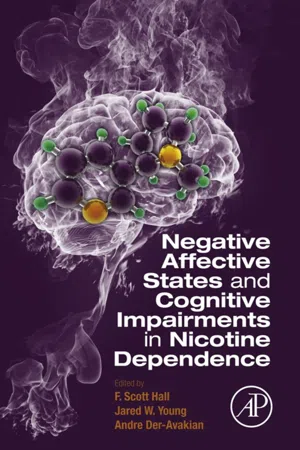
Negative Affective States and Cognitive Impairments in Nicotine Dependence
- 362 pages
- English
- ePUB (mobile friendly)
- Available on iOS & Android
Negative Affective States and Cognitive Impairments in Nicotine Dependence
About This Book
Negative Affective States and Cognitive Impairments in Nicotine Dependence is the only book of its kind that addresses nicotine use and abuse in the context of negative reinforcement mechanisms. Written and edited by leading investigators in addiction, affective, genetic, and cognitive research, it provides researchers and advanced students with an overview of the clinical bases of these effects, allowing them to fully understand the various underlying dysfunctions that drive nicotine use in different individuals. In addition, this book examines animal models that researchers have utilized to investigate the biological bases of these dysfunctions.
The combination of clinical and preclinical approaches to understanding nicotine dependence makes this book an invaluable resource for researchers and practitioners seeking to develop targeted treatments aimed at ameliorating symptoms of nicotine dependence, as well as identifying premorbid differences in affective or cognitive function.
- Provides a unique perspective on nicotine dependence that emphasizes negative reinforcement rather than positive reinforcement
- Examines psychiatric comorbidities and alleviation of withdrawal states as motivation for continued tobacco use
- Includes both clinical and preclinical perspectives
- Includes genetic and multi-neurotransmitter perspectives on nicotine use and withdrawal
- Emphasizes heterogeneity of underlying reasons for smoking, the need for multiple animal models to understand this heterogeneity, and the expectation of heterogeneous responses to potential treatments, underscoring the need for personalized therapeutics
Frequently asked questions
Information
Table of contents
- Cover image
- Title page
- Table of Contents
- Copyright
- Dedication
- List of Contributors
- Preface
- Acknowledgments
- Chapter 1. Overview of Nicotine Withdrawal and Negative Reinforcement (Preclinical)
- Chapter 2. Nicotine Withdrawal and Attentional Deficit Studies Across Species: Conflation With Attentional Dysfunction in Psychiatric Patients
- Chapter 3. Preclinical Models of Nicotine Withdrawal: Targeting Impaired Cognition
- Chapter 4. Genetic, Developmental, and Receptor-Level Influences on Nicotine Withdrawal-Associated Deficits in Learning
- Chapter 5. Enhanced Tobacco Use Vulnerability in Adolescents, Females, and Persons With Diabetes
- Chapter 6. Detrimental Effects of Prenatal Exposure to Tobacco Smoke and Nicotine
- Chapter 7. Contribution of Translational Genetic Research to Our Understanding of Nicotine Dependence
- Chapter 8. Transmitters and Receptors in Nicotine Withdrawal Syndrome
- Chapter 9. The Cannabinoid System in Nicotine Dependence and Withdrawal
- Chapter 10. Critical Role for Brain Stress Systems in the Negative Affective State Associated With Nicotine Withdrawal
- Chapter 11. The Habenulo-Interpeduncular Pathway and Nicotine Withdrawal
- Chapter 12. A Clinical Overview of Nicotine Dependence and Withdrawal
- Chapter 13. Epidemiologic Research on the Relationship of Nicotine Dependence to Psychiatric and Substance Use Disorders
- Chapter 14. Nicotine and Tobacco Smoking and Withdrawal in Schizophrenia
- Chapter 15. Emergent Cognitive Impairment During Early Nicotine Withdrawal
- Chapter 16. Nicotine and Posttraumatic Stress Disorder
- Chapter 17. Nicotine Withdrawal and Depression: Clinical Studies—A Four-Factor Model for More Accurate Characterization
- Chapter 18. Neuroimaging Insights Into the Multifaceted Nature of the Nicotine Withdrawal Syndrome
- Index